【备考小升初】专项复习一般现在时课件
图片预览


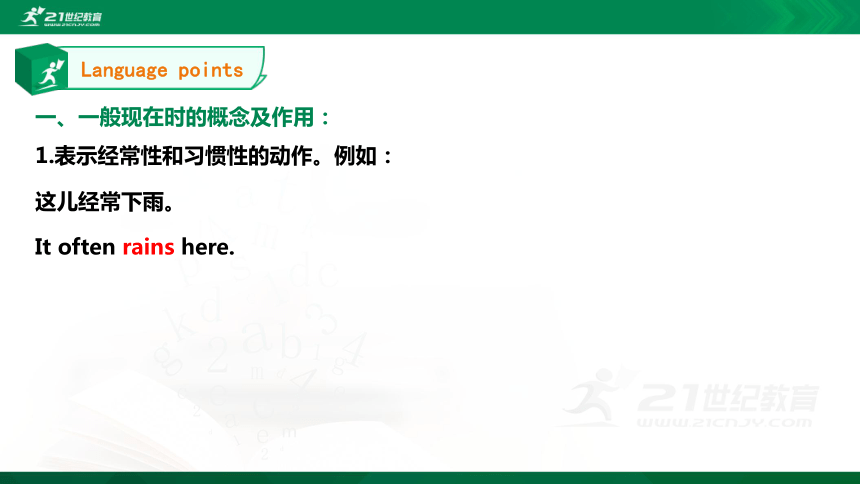


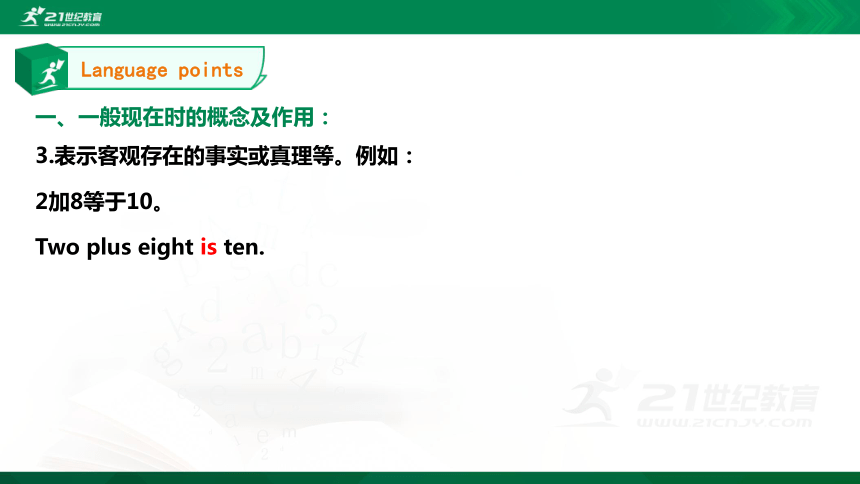
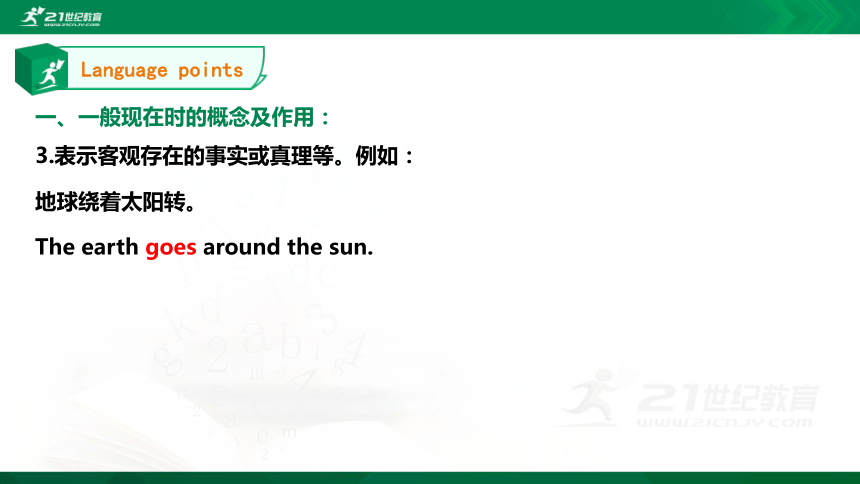

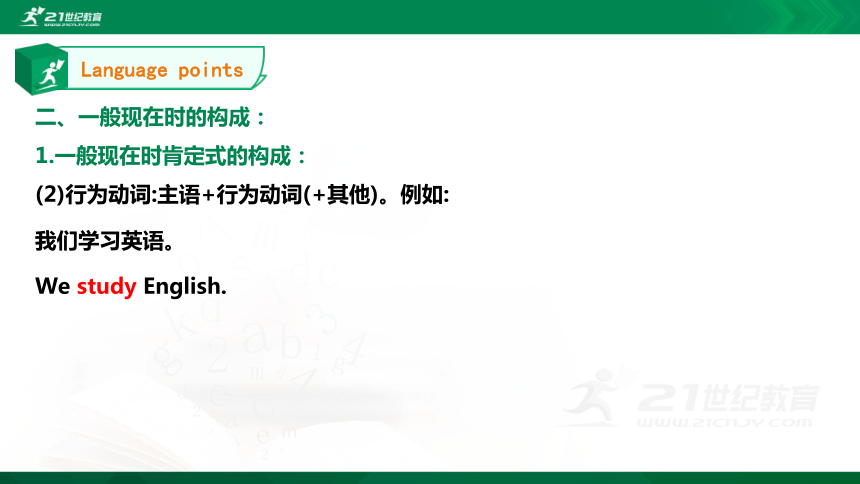
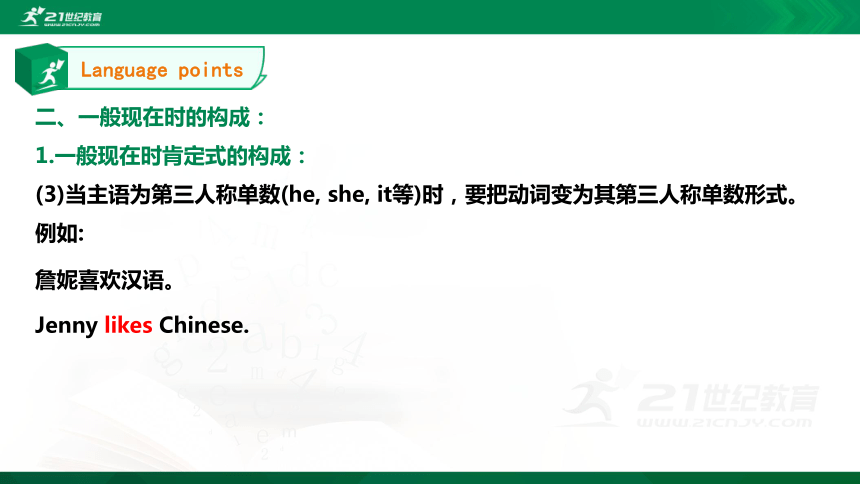
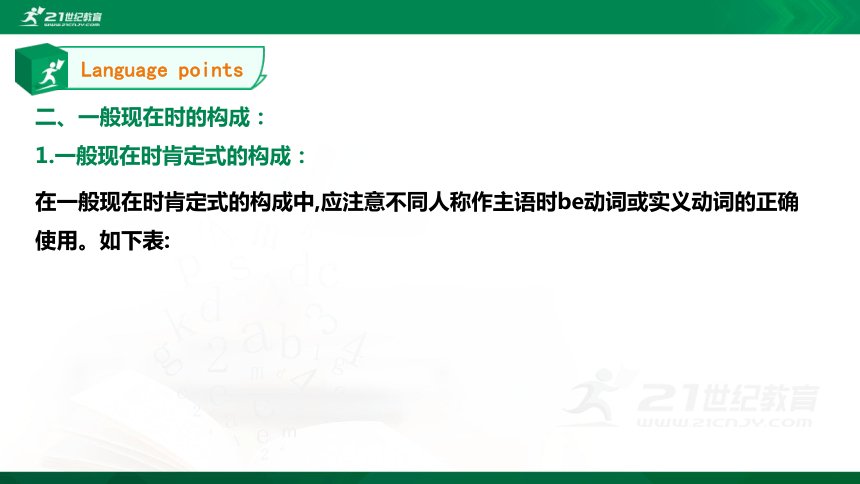
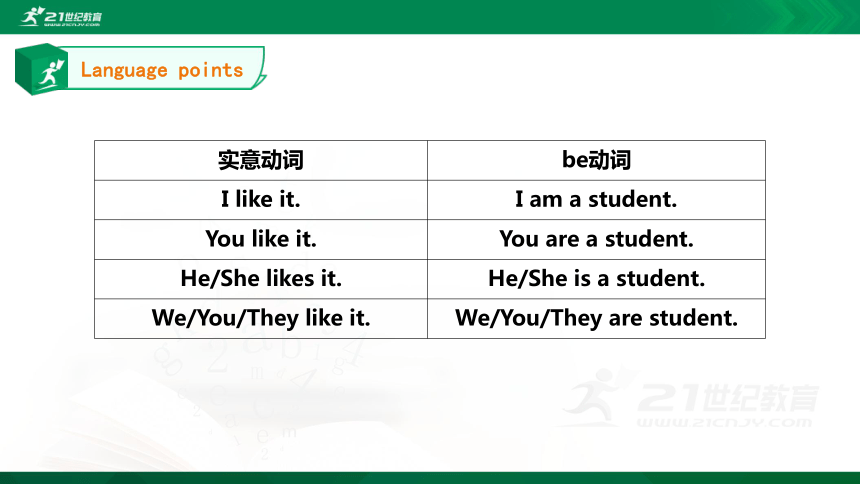
文档简介
(共33张PPT)
动词-一般现在时
通用版 小升初专题
一、一般现在时的概念及作用:
1.表示经常性和习惯性的动作。例如:
Language points
我每天六点起床。
I get up at six every day.
一、一般现在时的概念及作用:
1.表示经常性和习惯性的动作。例如:
Language points
这儿经常下雨。
It often rains here.
一、一般现在时的概念及作用:
2.表示人或事物现在的特征或状态。例如:
Language points
他喜欢唱歌。
He likes singing.
一、一般现在时的概念及作用:
2.表示人或事物现在的特征或状态。例如:
Language points
我是一名好学生。
I am a good student.
一、一般现在时的概念及作用:
3.表示客观存在的事实或真理等。例如:
Language points
2加8等于10。
Two plus eight is ten.
一、一般现在时的概念及作用:
3.表示客观存在的事实或真理等。例如:
Language points
地球绕着太阳转。
The earth goes around the sun.
二、一般现在时的构成:
1.一般现在时肯定式的构成:
(1)be动词:主语+be动词(am,is,are)+其他。例如:
Language points
我是一个女孩。
I am a girl.
二、一般现在时的构成:
1.一般现在时肯定式的构成:
(2)行为动词:主语+行为动词(+其他)。例如:
Language points
我们学习英语。
We study English.
二、一般现在时的构成:
1.一般现在时肯定式的构成:
(3)当主语为第三人称单数(he, she, it等)时,要把动词变为其第三人称单数形式。例如:
Language points
詹妮喜欢汉语。
Jenny likes Chinese.
二、一般现在时的构成:
1.一般现在时肯定式的构成:
Language points
在一般现在时肯定式的构成中,应注意不同人称作主语时be动词或实义动词的正确使用。如下表:
Language points
实意动词 be动词
I like it. I am a student.
You like it. You are a student.
He/She likes it. He/She is a student.
We/You/They likes it. We/You/They are student.
二、一般现在时的构成:
2.一般现在时否定式的构成:
Language points
一般现在时的否定式一般在动词前加do(es) not构成,动词用原形;be 动词则在后面加not构成;含有情态动词的在情态动词后面直接加not构成(can和not要合并)。如下表:
Language points
实意动词 be动词 情态动词
I/You/They do not like it.
He/She does not like it. I am not a student. I cannot speak Enlish.
He/She is not a student. He/She cannot speak Enlish.
We/You/They are not students. We/You/They cannot speak Enlish.
二、一般现在时的构成:
3.一般现在时的一般疑问式的构成:
Language points
一般现在时的一般疑问句一般在句首加助动词do或does构成。主语是第三人称单数加does,其他加do,这时主要动词一概用原形;be动词只需要与主语位置对调,句末用问号;含有情态动词的将情态动词提到句首,句末用问号。如下表:
Language points
实意动词 be动词 情态动词
Do you/I/we/they like it?
Does he/she like it? Are you/we/they students? Can you/we/they speak English?
Am I a student? Can I speak English?
Is he/she a student? Can he/she speak English?
二、一般现在时的构成:
4.一般现在时的特殊疑问句构成:疑问词+一般疑问句。例如:
Language points
她骑自行车去上学。
She goes to school by bike.
她怎么去上学?
How does she go to school?
Practice
真题演练:用所给动词的适当形式填空。
1.Does Gao Shan _______(sing)well?
sing
解析:句意:高山唱歌好么?句首有助动词does时,后用动词原形,故填sing。
Practice
真题演练:用所给动词的适当形式填空。
2. We usually __________ (play) football after school.
play
解析:句意:我们经常放学后踢足球。 句中有usually时,要用一般现在时,且主语为we,故填play。
Practice
真题演练:用所给动词的适当形式填空。
3. It often _______ (snow) here in winter.
snows
解析:句意:在这冬天经常下雪。句中有often时,要用一般现在时。it为第三人称单数,所以谓语动词要用第三人称单数形式,故填snows。
Practice
真题演练:用所给动词的适当形式填空。
4. Tom doesn't _______ (like) sports.
like
解析:句意:汤姆不喜欢运动。句中有doesn't时,后面的动词要用原形,故填like。
Practice
随堂演练:翻译句子,每空一词。
1.我们通常在平安夜把袜子放在床上,等待礼物。
We usually __________ stockings on the bed and __________ __________ presents on Christmas Eve.
put wait
for
解析:放置用动词put,等待是动词短语wait for。主语是we所以用动词原形。
Practice
随堂演练:翻译句子,每空一词。
2.高山游得比你快吗?
___________ Gao Shan __________ ___________ than you?
Does swim faster
解析:当主语是第三人称单数时,一般疑问句的提问用does,后接动词原形。
Practice
随堂演练:翻译句子,每空一词。
3.他父亲不喜欢集邮。
His father ___________ ____________ ___________ stamps.
doesn't like collecting
解析:当主语是第三人称单数时,否定句在does后面接not。like doing sth.表示喜欢做某事,属于固定搭配。
Practice
随堂演练:翻译句子,每空一词。
4.孩子们喜欢在秋天举行野餐。
The children like to ___________ ____________ ___________ in autumn.
have a picnic
解析:野餐是have a picinic属于固定搭配。to do是动词不定式,所以have保持原形。
Practice
随堂演练:翻译句子,每空一词。
5.你的网友住在哪里?
Where __________ your e-friend __________ ?
does live
解析:特殊疑问句由特殊疑问词加一般疑问句构成。当主语是第三人称单数时,选择助动词does提问,后面把持动词原形。
Summary
一、一般现在时的概念及作用:
1.表示经常性和习惯性的动作。2.表示人或事物现在的特征或状态。3.表示客观存在的事实或真理等。
二、构成:
1.一般现在时肯定式的构成:
(1)be动词:主语+be动词(am,is,are)+其他。
(2)行为动词:主语+行为动词(+其他)。
(3)当主语为第三人称单数(he, she, it等)时,要把动词变为其第三人称单数形式。
Summary
2.一般现在时否定式的构成:
一般现在时的否定式一般在动词前加do(es) not构成,动词用原形;be 动词则在后面加not构成;含有情态动词的在情态动词后面直接加not构成(can和not要合并)。
3.一般现在时的一般疑问式的构成:
一般现在时的一般疑问句一般在句首加助动词do或does构成。主语是第三人称单数加does,其他加do,这时主要动词一概用原形;be动词只需要与主语位置对调,句末用问号;含有情态动词的将情态动词提到句首,句末用问号。
4.一般现在时的特殊疑问句构成:疑问词+一般疑问句。
Homework
用所给动词的适当形式填空。
1. They often __________ (have) dinner at home.
2. Yang Ling and Su Yang __________ (be) at school.
3. We ________________ (not watch) TV on Mondays.
4. John _______________ (not go) to the 200 on Sundays.
5.__________ they __________ (like) the World Cup?
6, What __________ Tom often __________ (do) on Saturdays?
7. _________ your parents __________ (read) newspapers every day?
8. The woman __________ (teach) us English this term.
have
are
don't watch
doesn't go
Do like
does do
Do read
teaches
Homework
用所给动词的适当形式填空。
9. She and I _________ (walk) home together every day.
10. There _________ (be) some water in the bottle.
11. Mike _________ (like) cooking.
12. Su Hai only _________ (have) a little sweet food at a time.
13. My aunt _________ (look) after her baby carefully.
14. Wang Bing always _________ (finish) his homework well.
15.I __________ (be) ill. I'm staying in bed.
16. She ___________ (go) to school from Monday to Friday.
walk
is
likes
has
looks
finishes
am
goes
Homework
用所给动词的适当形式填空。
17. LiuTao ________________ (not like) English.
18. The child often ___________ (watch) TV in the evening.
19. Can Liu Tao __________ (write) in English?
20. Who ____________ (want) to go to the cinema with us?
doesn't like
watches
write
wants
谢谢
21世纪教育网(www.21cnjy.com) 中小学教育资源网站
有大把高质量资料?一线教师?一线教研员?
欢迎加入21世纪教育网教师合作团队!!月薪过万不是梦!!
详情请看:
https://www.21cnjy.com/help/help_extract.php
动词-一般现在时
通用版 小升初专题
一、一般现在时的概念及作用:
1.表示经常性和习惯性的动作。例如:
Language points
我每天六点起床。
I get up at six every day.
一、一般现在时的概念及作用:
1.表示经常性和习惯性的动作。例如:
Language points
这儿经常下雨。
It often rains here.
一、一般现在时的概念及作用:
2.表示人或事物现在的特征或状态。例如:
Language points
他喜欢唱歌。
He likes singing.
一、一般现在时的概念及作用:
2.表示人或事物现在的特征或状态。例如:
Language points
我是一名好学生。
I am a good student.
一、一般现在时的概念及作用:
3.表示客观存在的事实或真理等。例如:
Language points
2加8等于10。
Two plus eight is ten.
一、一般现在时的概念及作用:
3.表示客观存在的事实或真理等。例如:
Language points
地球绕着太阳转。
The earth goes around the sun.
二、一般现在时的构成:
1.一般现在时肯定式的构成:
(1)be动词:主语+be动词(am,is,are)+其他。例如:
Language points
我是一个女孩。
I am a girl.
二、一般现在时的构成:
1.一般现在时肯定式的构成:
(2)行为动词:主语+行为动词(+其他)。例如:
Language points
我们学习英语。
We study English.
二、一般现在时的构成:
1.一般现在时肯定式的构成:
(3)当主语为第三人称单数(he, she, it等)时,要把动词变为其第三人称单数形式。例如:
Language points
詹妮喜欢汉语。
Jenny likes Chinese.
二、一般现在时的构成:
1.一般现在时肯定式的构成:
Language points
在一般现在时肯定式的构成中,应注意不同人称作主语时be动词或实义动词的正确使用。如下表:
Language points
实意动词 be动词
I like it. I am a student.
You like it. You are a student.
He/She likes it. He/She is a student.
We/You/They likes it. We/You/They are student.
二、一般现在时的构成:
2.一般现在时否定式的构成:
Language points
一般现在时的否定式一般在动词前加do(es) not构成,动词用原形;be 动词则在后面加not构成;含有情态动词的在情态动词后面直接加not构成(can和not要合并)。如下表:
Language points
实意动词 be动词 情态动词
I/You/They do not like it.
He/She does not like it. I am not a student. I cannot speak Enlish.
He/She is not a student. He/She cannot speak Enlish.
We/You/They are not students. We/You/They cannot speak Enlish.
二、一般现在时的构成:
3.一般现在时的一般疑问式的构成:
Language points
一般现在时的一般疑问句一般在句首加助动词do或does构成。主语是第三人称单数加does,其他加do,这时主要动词一概用原形;be动词只需要与主语位置对调,句末用问号;含有情态动词的将情态动词提到句首,句末用问号。如下表:
Language points
实意动词 be动词 情态动词
Do you/I/we/they like it?
Does he/she like it? Are you/we/they students? Can you/we/they speak English?
Am I a student? Can I speak English?
Is he/she a student? Can he/she speak English?
二、一般现在时的构成:
4.一般现在时的特殊疑问句构成:疑问词+一般疑问句。例如:
Language points
她骑自行车去上学。
She goes to school by bike.
她怎么去上学?
How does she go to school?
Practice
真题演练:用所给动词的适当形式填空。
1.Does Gao Shan _______(sing)well?
sing
解析:句意:高山唱歌好么?句首有助动词does时,后用动词原形,故填sing。
Practice
真题演练:用所给动词的适当形式填空。
2. We usually __________ (play) football after school.
play
解析:句意:我们经常放学后踢足球。 句中有usually时,要用一般现在时,且主语为we,故填play。
Practice
真题演练:用所给动词的适当形式填空。
3. It often _______ (snow) here in winter.
snows
解析:句意:在这冬天经常下雪。句中有often时,要用一般现在时。it为第三人称单数,所以谓语动词要用第三人称单数形式,故填snows。
Practice
真题演练:用所给动词的适当形式填空。
4. Tom doesn't _______ (like) sports.
like
解析:句意:汤姆不喜欢运动。句中有doesn't时,后面的动词要用原形,故填like。
Practice
随堂演练:翻译句子,每空一词。
1.我们通常在平安夜把袜子放在床上,等待礼物。
We usually __________ stockings on the bed and __________ __________ presents on Christmas Eve.
put wait
for
解析:放置用动词put,等待是动词短语wait for。主语是we所以用动词原形。
Practice
随堂演练:翻译句子,每空一词。
2.高山游得比你快吗?
___________ Gao Shan __________ ___________ than you?
Does swim faster
解析:当主语是第三人称单数时,一般疑问句的提问用does,后接动词原形。
Practice
随堂演练:翻译句子,每空一词。
3.他父亲不喜欢集邮。
His father ___________ ____________ ___________ stamps.
doesn't like collecting
解析:当主语是第三人称单数时,否定句在does后面接not。like doing sth.表示喜欢做某事,属于固定搭配。
Practice
随堂演练:翻译句子,每空一词。
4.孩子们喜欢在秋天举行野餐。
The children like to ___________ ____________ ___________ in autumn.
have a picnic
解析:野餐是have a picinic属于固定搭配。to do是动词不定式,所以have保持原形。
Practice
随堂演练:翻译句子,每空一词。
5.你的网友住在哪里?
Where __________ your e-friend __________ ?
does live
解析:特殊疑问句由特殊疑问词加一般疑问句构成。当主语是第三人称单数时,选择助动词does提问,后面把持动词原形。
Summary
一、一般现在时的概念及作用:
1.表示经常性和习惯性的动作。2.表示人或事物现在的特征或状态。3.表示客观存在的事实或真理等。
二、构成:
1.一般现在时肯定式的构成:
(1)be动词:主语+be动词(am,is,are)+其他。
(2)行为动词:主语+行为动词(+其他)。
(3)当主语为第三人称单数(he, she, it等)时,要把动词变为其第三人称单数形式。
Summary
2.一般现在时否定式的构成:
一般现在时的否定式一般在动词前加do(es) not构成,动词用原形;be 动词则在后面加not构成;含有情态动词的在情态动词后面直接加not构成(can和not要合并)。
3.一般现在时的一般疑问式的构成:
一般现在时的一般疑问句一般在句首加助动词do或does构成。主语是第三人称单数加does,其他加do,这时主要动词一概用原形;be动词只需要与主语位置对调,句末用问号;含有情态动词的将情态动词提到句首,句末用问号。
4.一般现在时的特殊疑问句构成:疑问词+一般疑问句。
Homework
用所给动词的适当形式填空。
1. They often __________ (have) dinner at home.
2. Yang Ling and Su Yang __________ (be) at school.
3. We ________________ (not watch) TV on Mondays.
4. John _______________ (not go) to the 200 on Sundays.
5.__________ they __________ (like) the World Cup?
6, What __________ Tom often __________ (do) on Saturdays?
7. _________ your parents __________ (read) newspapers every day?
8. The woman __________ (teach) us English this term.
have
are
don't watch
doesn't go
Do like
does do
Do read
teaches
Homework
用所给动词的适当形式填空。
9. She and I _________ (walk) home together every day.
10. There _________ (be) some water in the bottle.
11. Mike _________ (like) cooking.
12. Su Hai only _________ (have) a little sweet food at a time.
13. My aunt _________ (look) after her baby carefully.
14. Wang Bing always _________ (finish) his homework well.
15.I __________ (be) ill. I'm staying in bed.
16. She ___________ (go) to school from Monday to Friday.
walk
is
likes
has
looks
finishes
am
goes
Homework
用所给动词的适当形式填空。
17. LiuTao ________________ (not like) English.
18. The child often ___________ (watch) TV in the evening.
19. Can Liu Tao __________ (write) in English?
20. Who ____________ (want) to go to the cinema with us?
doesn't like
watches
write
wants
谢谢
21世纪教育网(www.21cnjy.com) 中小学教育资源网站
有大把高质量资料?一线教师?一线教研员?
欢迎加入21世纪教育网教师合作团队!!月薪过万不是梦!!
详情请看:
https://www.21cnjy.com/help/help_extract.php
